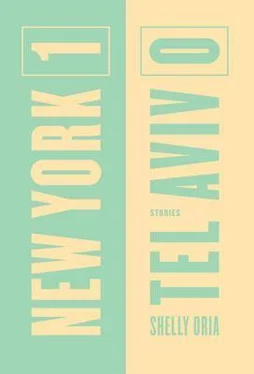* * *
I used to be different; I used to find comfort in time-stops. I’d close my eyes and feel like I was in some underground maze; I couldn’t get anywhere, but I wasn’t supposed to. I try to remind myself of that every time I open my eyes to a new gray day. Still, I often forget.
* * *
This all happened a long time ago, though experts would argue that I can’t technically say that. That’s what it feels like, anyway, and I am now part of the Time Language Movement, so using these terms is a cause I spend my days fighting for. We believe in the power of language, and we believe that by using time expressions we can, at the very least, create an illusion of passing time so strong that it functions as the real thing in essentially every way.
Nobody in the movement knows about Phil, or about my involvement in what is now referred to as The Big One. I believe that, since we’re all working for the same cause, none of that should matter. Phil, in turn, believes Language people are no different from Time Counters and other types of lunatics.
These days, he mainly operates from what he calls the Factory — a huge facility just outside of town, where they used to make cribs before everyone stopped needing to buy new ones. I know where it is, but I’ve never been there. If things between us were different, if I woke up one day and believed in his operation and wanted to do my part, I imagine he would take me over, give me the grand tour. I imagine he’d want me to fully understand the mechanics behind the dam that holds time back. I imagine he’d be happy. And some days I think Why not? Why not make him happy? But I know this: we are playing against each other in a staring match; if I look down, I have lost, and Phil will never change. And perhaps that’s true anyway, perhaps I have already lost.
I still practice my profession. I rent a small bath at a Soaping Inc. downtown. They call me every time one of my clients shows up, and I usually drop everything and go. It’s a good arrangement for me, given that I can’t see clients at home anymore; letting strangers into the apartment is exactly the kind of mistake Phil would never make. If anyone ever knew enough to come looking, the files stacked in his study (once mine, then ours, now his) would expose everything. It sometimes seems that when I so much as look at them in passing, he can sense it.
There’s no phone at the Factory, no way to reach Phil when he’s there, and yet every morning before he leaves, he says, I’ll be at the Factory, as if we’re already a family, and maybe our daughter would have an earache and I would need him to come home.
* * *
Yesterday, we were sitting on the balcony, drinking champagne and eating crackers. The dim gray light outside was getting to me, the way it often does. I looked at the color of the champagne in my glass, then at the gray light, and again, and again. I was trying to concentrate so that one would somehow spark the other, but whatever gift I had, it’s gone; I sold it for hope.
Phil said, Bambi, that’s cute, what you’re trying to do. He was mocking me, and it hurt, of course, but I’ve gotten used to this kind of pain. I looked at him. Sometimes he says unkind things but you can still see kindness underneath them. At the end of each evening, before we go to sleep, he goes to the kitchen and checks my vitamin jar, to make sure I’ve taken all my Nutrient Pills for the day. I said, What about what you promised me, Phil? What about the baby? I’d intended never to ask him that, but all of a sudden I forgot why.
He said, We’ll get there, Bamb, we’ll get there. When? I asked. How about next year, he said, 2012? Pretending to set a date was his favorite joke these days.
I decided to try a different approach. Phil, I said, look at us. We have all the money in the world. Isn’t that enough? It’s enough, Phil, don’t you see that?
I assumed that he’d feign agreement, let me relax; we both knew that he wasn’t just making a profit, but also holding on as tight as he could, sitting on top of the whole still world without leaving our balcony. But he just sat there with a smile on his face that I’d never seen before, and seemed immersed in some conversation I couldn’t hear. Finally, he got up, put the champagne glass down, helped a few crumbs slide down his pants. He looked down at me, and sternness took over the smile. I never understood women, he said, so smart and so stupid at the same time. I was waiting for him to explain, and then realized that he wouldn’t, because he wasn’t talking to me, not really. He was quiet for a few seconds, then said, Money? Money? For fuck’s sake, Bambi, we’re living here in your crummy little apartment and you still think it’s about the money?
He took a deep breath that said my stupidity caused him great pain. His disappointment hung heavy in the air, and I knew this was the moment when Phil had given up on me for good. I wanted to drink all the champagne until it made me throw up, then drink some more. Money, Bambi, he said like he was the president of a great nation and I was the ignorant masses he was preaching to, is always, always, a means to an end. Remember that if you remember nothing else. And with that he turned his back to me and walked into the living room. I noticed there were crumbs on his ass that he must not have been aware of, remnants of the crackers we ate. This would have bothered him, I thought. Phil is a very tidy man.
MAYBE IN A DIFFERENT TIME
I’d gone thirty-six years without donating blood, had made a name for myself in my community for being the only man who refused to donate even on leap years, when they pay more. Our town boasts the largest bloodbank in North America, and since the war, which started before anyone can remember, most folks around either work at the bank or donate for a living. My father took me to watch him donate when I was four. I didn’t faint or cry like my friend Jordan F, like so many kids on their first viewings. I stood still and silent, narrowing my eyes at the nurse. When she was done, I asked for the tube. It’s my dad’s blood, I said, not yours. The nurse smiled, said, That’s not how it works, honey pie. My father seemed frustrated; he’d explained the whole thing before we left the house. I squinted at them for a few more seconds, turned around and left the room.
* * *
In my twenties I had fire in my bones, something pushing me to teach this town some lessons. I can safely say the only people around who liked me were my sister and Jordan F. Everyone else thought I was a hippie or a bum, because why else would I not work in blood? But I never considered leaving. In my dreams, I was running for council and everyone was calling it a slam dunk.
* * *
Making a fortune seemed a good first step, so I tried my best. It’s the money that wins the war at the end, not the blood, but no one around me seemed to know it. I made some good investments, learned to spot the investments that would later invest on their own. I can’t say that I made a fortune, but for a while I was doing okay. Several times, I invited Jordan F to join in when I had a good lead, but he always coughed and said Thanks, I’m good. The truth was, my minor success made no difference; the town still looked down on me. Jordan F always stood by my side, but he managed to do that without risking his reputation. His job made it easy — people here respect the bloodtruck drivers, because at the end of the day everyone’s hard work is in their hands, and because they are privy to more classified information than most. As Jordan F says, You can’t drive with your eyes closed. But if Jordan F started investing with me, people’s perception of him would change. And I guess I wasn’t making enough money to make that worthwhile.
Читать дальше












